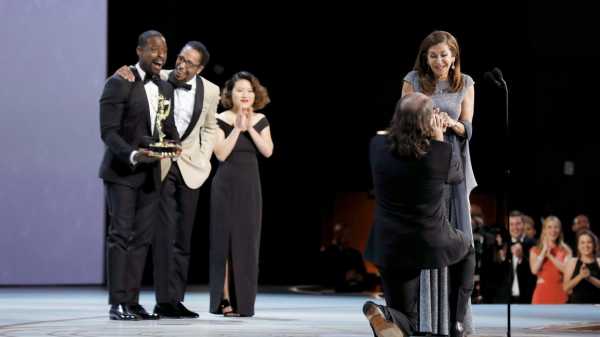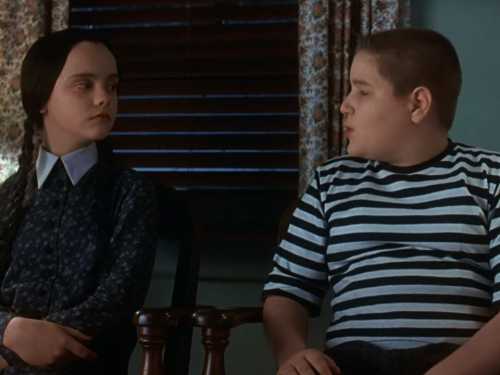
First things first: Thank God Jan said yes.
Halfway into the seventieth annual Primetime Emmy Awards, Glenn Weiss pulled one of the oldest television tricks in the book: a surprise proposal, straight out of a sitcom season finale. Weiss was accepting the award for Outstanding Directing for a Variety Special, for his direction of the Academy Awards. Already, we had reached my favorite part of any Emmy broadcast, when they start giving awards to other awards shows. Every year, it boggles the mind, like a Buddhist koan: What is the sound of one hand clapping for itself?
Weiss, who had already won several Emmys for directing the Tonys, surely knows that the best awards telecasts have that one spontaneous moment to burst through the scripted patter, and so he provided one. His speech was already a tearjerker when he acknowledged his mother, who had passed away two weeks earlier. Then he turned to his date, Jan Svendsen, and told her, “You wonder why I don’t like to call you my girlfriend? Because I want to call you my wife.” The audience screamed, as Svendsen, in shock, ascended to the stage and accepted the ring that Weiss’s father gave to his mother sixty-seven years ago. “Thank you to the Academy,” Weiss concluded—a sound start to any marriage.
Nerd love probably wasn’t the theme that this year’s Emmys were going for, but, throughout the night, awkwardness provided some of the show’s best moments. Merritt Wever, accepting her award for the Netflix miniseries “Godless,” untangled her notes and muttered, “I’m still shocked you made a space for me.” After Maya Rudolph and Fred Armisen’s faux-cringey Emmy-historian bits, it was refreshing to see the genuinely meek inherit the stage. Then there was Hannah Gadsby, the patron saint of introverts, whose post-“Nanette” victory lap was appropriately squeamish and spiky. “Nobody knows what jokes are, especially men,” she said. “That’s why I’m presenting alone.” She was there to announce the award for Outstanding Directing for a Drama Series, which went to Stephen Daldry, for “The Crown.” Daldry wasn’t there, so Gadsby accepted on his behalf. “Think I just leave now?” she said, shuffling off. “And . . . well done, him.”
The rest of the night, in contrast, was slick, scripted, and on message. Lorne Michaels, producing his second Emmys broadcast in thirty years, populated the stage with past and present stars of “Saturday Night Live,” including the night’s hosts, Colin Jost and Michael Che, whose one-liners bore their patented brand of smug. Michaels also gave the night’s least inspiring speech, while accepting the award for Outstanding Variety Sketch Series, for “S.N.L.” “In 1975, when we started, there were a lot of articles for most of that decade about how the networks wouldn’t be here much longer,” he said. “And here we are, it’s 2018, and we’re the Emmys and we’re on NBC.” Um, go, networks?
Elsewhere, Michaels’s “S.N.L.” charges celebrated what has changed since the seventies, and what still needs to. Che, free of Jost for a blessed few minutes, pulled off a dicey sketch called “The Reparation Emmys,” handing retroactive awards to Marla Gibbs, Jaleel White, and other veteran black TV stars. Kate McKinnon and Kenan Thompson started the show with the song “We Fixed It,” a tongue-in-cheek ode to illusory progress. (“Pat yourself on the back . . . but don’t touch your neighbor.”) Later on, the president of the Television Academy, Hayma Washington, delivered the same message minus the irony, when he praised inclusion in the industry and told the crowd, “Let’s give ourselves a hand.”
Of course, there was plenty of diversity to applaud. Sandra Oh (“Killing Eve”), seated beside her mother, was the first Asian woman to be nominated for a lead-actress Emmy. Amy Sherman-Palladino, the creator of “The Marvelous Mrs. Maisel” and wearer of kooky hats, became the first woman to win writing and directing awards in the same year. And there were L.G.B.T. victories for “RuPaul’s Drag Race” (Reality Competition Program) and “The Assassination of Gianni Versace: American Crime Story” (Limited Series). Still, there must have been more uneasiness in the hall than met the eye. One of those networks that Lorne Michaels cherishes was decapitated ten short days ago, when Les Moonves resigned his post as the chairman and C.E.O. of CBS amid sexual-misconduct allegations. Another network, ABC, had to fire Roseanne Barr, the star of its smash hit of the year, for a racist tweet, having indulged her Trumpian politics in the first place. Sure, television is making encouraging strides in representation (it’s way ahead of movies), but the country’s darkest demons are still popping out of its closets.
So let us celebrate what we can, while we can. Betty White, at ninety-six, can still land a punch line. (“You think I’m gonna miss a chance when I get it?” she said, after smooching Alec Baldwin.) Henry Winkler, at seventy-two, won his first Primetime Emmy, for “Barry,” telling his adult children, “You can go to bed now. Daddy won!” Jeff Daniels, a winner for “Godless,” thanked his horse. (“He was Jeff Bridges’s horse on ‘True Grit,’ and I felt he was making unfair comparisons.”) Also thanked: Jesus (by Regina King, of “Seven Seconds”), the city of Belfast (D. B. Weiss, the co-creator of “Game of Thrones”), and “the beautiful brigade that is Amblin Television” (Matthew Rhys, of “The Americans”). Thandie Newton, who won for “Westworld,” did them all one better: “I don’t even believe in God, but I’m going to thank her tonight.”
It was a good night to be Ryan Murphy, Darren Criss, John Oliver, Claire Foy, anyone connected with “The Marvelous Mrs. Maisel,” and, presumably, Jan. But, for the losers who deserved better—Tracee Ellis Ross, Keri Russell, Betty Gilpin, Brian Tyree Henry, Vanessa Kirby, “GLOW”—Michael Douglas had words of wisdom, if not of comfort: “Carry that rage. Let it fuel everything you do from this night forward. Know that you were cheated. You were robbed. That’s a fact. Let that fire burn in your belly until your cold, dead body is in a pine box six feet deep, clutching all its Emmys to its chest.”
For the epitaph, I’d suggest: “Well done, him.”
Sourse: newyorker.com






